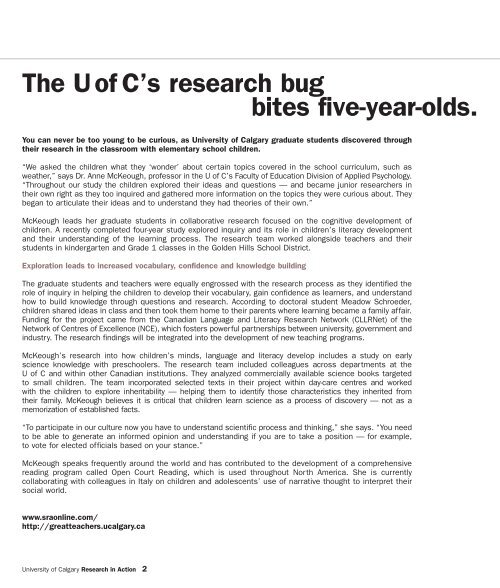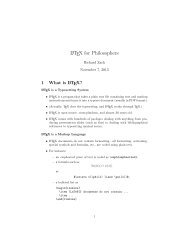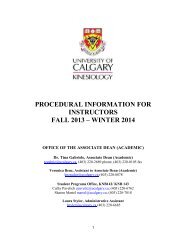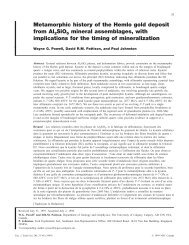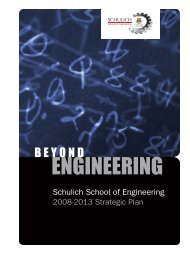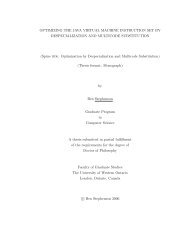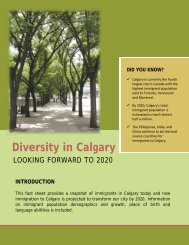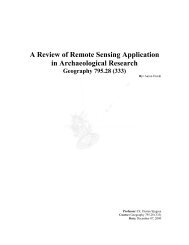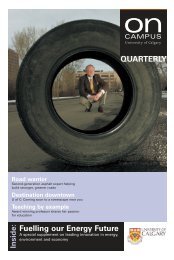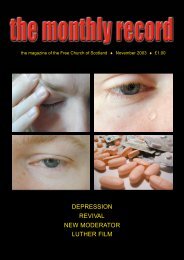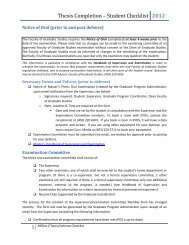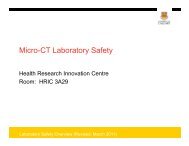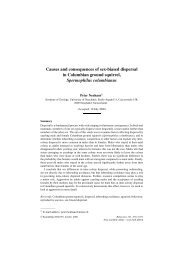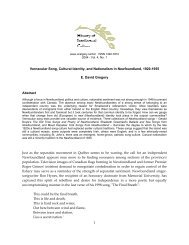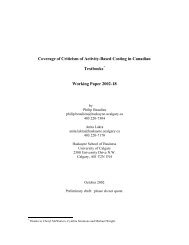Research in Action: Public - University of Calgary
Research in Action: Public - University of Calgary
Research in Action: Public - University of Calgary
Create successful ePaper yourself
Turn your PDF publications into a flip-book with our unique Google optimized e-Paper software.
The U <strong>of</strong> C’s research bug<br />
bites five-year-olds.<br />
You can never be too young to be curious, as <strong>University</strong> <strong>of</strong> <strong>Calgary</strong> graduate students discovered through<br />
their research <strong>in</strong> the classroom with elementary school children.<br />
“We asked the children what they ‘wonder’ about certa<strong>in</strong> topics covered <strong>in</strong> the school curriculum, such as<br />
weather,” says Dr. Anne McKeough, pr<strong>of</strong>essor <strong>in</strong> the U <strong>of</strong> C’s Faculty <strong>of</strong> Education Division <strong>of</strong> Applied Psychology.<br />
“Throughout our study the children explored their ideas and questions — and became junior researchers <strong>in</strong><br />
their own right as they too <strong>in</strong>quired and gathered more <strong>in</strong>formation on the topics they were curious about. They<br />
began to articulate their ideas and to understand they had theories <strong>of</strong> their own.”<br />
McKeough leads her graduate students <strong>in</strong> collaborative research focused on the cognitive development <strong>of</strong><br />
children. A recently completed four-year study explored <strong>in</strong>quiry and its role <strong>in</strong> children’s literacy development<br />
and their understand<strong>in</strong>g <strong>of</strong> the learn<strong>in</strong>g process. The research team worked alongside teachers and their<br />
students <strong>in</strong> k<strong>in</strong>dergarten and Grade 1 classes <strong>in</strong> the Golden Hills School District.<br />
Exploration leads to <strong>in</strong>creased vocabulary, confidence and knowledge build<strong>in</strong>g<br />
The graduate students and teachers were equally engrossed with the research process as they identified the<br />
role <strong>of</strong> <strong>in</strong>quiry <strong>in</strong> help<strong>in</strong>g the children to develop their vocabulary, ga<strong>in</strong> confidence as learners, and understand<br />
how to build knowledge through questions and research. Accord<strong>in</strong>g to doctoral student Meadow Schroeder,<br />
children shared ideas <strong>in</strong> class and then took them home to their parents where learn<strong>in</strong>g became a family affair.<br />
Fund<strong>in</strong>g for the project came from the Canadian Language and Literacy <strong>Research</strong> Network (CLLRNet) <strong>of</strong> the<br />
Network <strong>of</strong> Centres <strong>of</strong> Excellence (NCE), which fosters powerful partnerships between university, government and<br />
<strong>in</strong>dustry. The research f<strong>in</strong>d<strong>in</strong>gs will be <strong>in</strong>tegrated <strong>in</strong>to the development <strong>of</strong> new teach<strong>in</strong>g programs.<br />
McKeough’s research <strong>in</strong>to how children’s m<strong>in</strong>ds, language and literacy develop <strong>in</strong>cludes a study on early<br />
science knowledge with preschoolers. The research team <strong>in</strong>cluded colleagues across departments at the<br />
U <strong>of</strong> C and with<strong>in</strong> other Canadian <strong>in</strong>stitutions. They analyzed commercially available science books targeted<br />
to small children. The team <strong>in</strong>corporated selected texts <strong>in</strong> their project with<strong>in</strong> day-care centres and worked<br />
with the children to explore <strong>in</strong>heritability — help<strong>in</strong>g them to identify those characteristics they <strong>in</strong>herited from<br />
their family. McKeough believes it is critical that children learn science as a process <strong>of</strong> discovery — not as a<br />
memorization <strong>of</strong> established facts.<br />
“To participate <strong>in</strong> our culture now you have to understand scientific process and th<strong>in</strong>k<strong>in</strong>g,” she says. “You need<br />
to be able to generate an <strong>in</strong>formed op<strong>in</strong>ion and understand<strong>in</strong>g if you are to take a position — for example,<br />
to vote for elected <strong>of</strong>ficials based on your stance.”<br />
McKeough speaks frequently around the world and has contributed to the development <strong>of</strong> a comprehensive<br />
read<strong>in</strong>g program called Open Court Read<strong>in</strong>g, which is used throughout North America. She is currently<br />
collaborat<strong>in</strong>g with colleagues <strong>in</strong> Italy on children and adolescents’ use <strong>of</strong> narrative thought to <strong>in</strong>terpret their<br />
social world.<br />
www.sraonl<strong>in</strong>e.com/<br />
http://greatteachers.ucalgary.ca<br />
<strong>University</strong> <strong>of</strong> <strong>Calgary</strong> <strong>Research</strong> <strong>in</strong> <strong>Action</strong> 2


